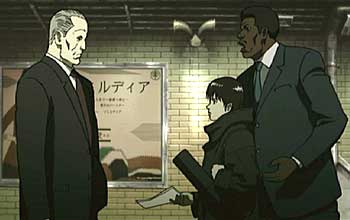
by Luis Reyes
|
Is this practice of out-sourcing going to spark the development of great animators in places that receive out-sourced work? If animation is now being readily out-sourced to Korea, is Korea going to blossom into an animation powerhouse? MI: Probably, because places like Korea are handling lauded shows like "X-Men" and "Batman." But even in Korea animation work is getting too expensive. The skill level of Korean animators and manga artists is rising rapidly. Korea, now that they're doing all the in-between work, has the environment and systems in place to grow good animators. Most of the work they do is still outsourced work from the US and Japan. Japan produces about a hundred original titles at any one time while Korea produces about five. Right now they're trying to get into computer-generated animation.
If Korea is getting too expensive, where is the best place to have animation done now? MI: China is the best place right now.
We spoke earlier about the video game for "Blood" and what video game work means for Production I.G's future. How would you change the way you tell stories to accommodate the video game format? MI: Movies are very one-directional, there's only one-way to move. There's a story that wants to be told. There are scenes that need to be shot. A creator has to make a decision about what course the story is going to take and follow through with that decision. The difference between animation and games is that in a game the main character doesn't require a central focus. There is a main character in film. Throughout the film we follow the character and that's what makes the audience feel, identifying with that main character while standing outside the experience of that main character. In a game, there isn't a main character because the player is in control; the player decides in what direction the story is going to go. So it's more important to develop all of the characters that appear around the main character.
Games like "Final Fantasy IX" are extremely unidirectional, though, to the point sometimes at which the game is a distraction from the story. Do you feel that when Production I.G creates video games, the creators will address that? Will you develop games in which the story can actually change based on decisions made by the player? MI: I actually can't comment on that because I've never played "Final Fantasy." But as for I.G, we plan on making the game completely interactive. There will be a main story but things will branch out from there. So you can choose. The ending can be a sad ending or a happy ending.
The "Blood" video game has already been released in Japan; do you want to release it in the US? What is in the future for Production I.G in regards to the US market? MI: I think that I.G is very unique in that it's small and it has built itself through subsequent projects. Once a project is done, that gives us room to go on to more projects. Other studios like Sunrise, which has Bandai behind it, or Studio Ghibli, which has Tokuma Shoten behind it, companies that are being financially supported by large corporations, are given limitation to their creativity. With Production I.G, there isn't that limitation. So even though we are small now, when we get larger we can go in a whole separate direction than Sunrise and Ghibli; we have the flexibility to change and evolve into an entirely different kind of company. As far as going abroad is concerned, that kind of flexibility enables us to work well with, say, a Hollywood company because we have no limitations, because nothing has been set yet. We have the staff, we can make decisions easily and quickly, so we would eventually like to do something with Hollywood.
Since a lot of the post-production work for "Blood" was done in America, are there any plans to do anymore post-production work here? MI: The project that we are working on currently is being done the same way.
|

